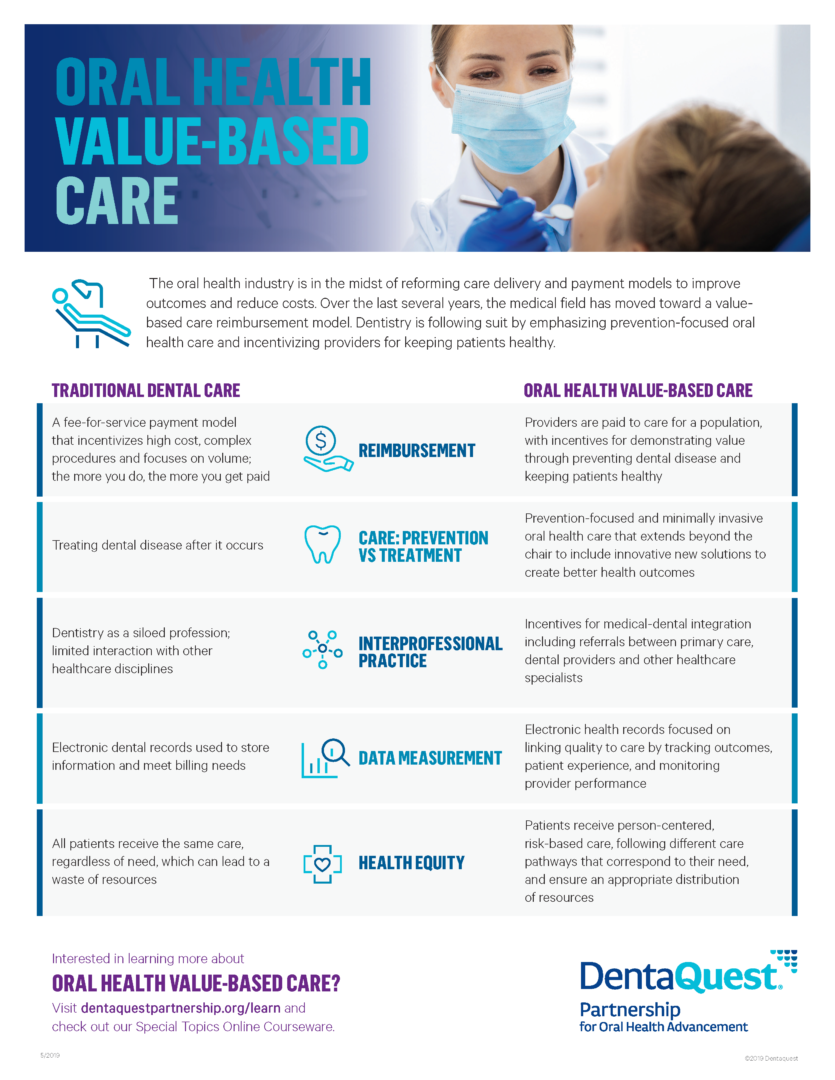Value-based care is coming to North Carolina. While dentistry may not be included in the first wave, oral health care providers should be prepared to make the transition sooner rather than later.
Given this reality, NCOHC will be launching a “value in dentistry” educational campaign in the coming weeks. This campaign will focus on giving both provider and consumer communities a chance to better understand how value-based care and associated payment restructuring in oral health care could work.
In 2015, the North Carolina General Assembly enacted a bill directing the Department of Health and Human Services (DHHS) to transition the state’s Medicaid program from its traditional fee-for-service model to Medicaid Managed Care.
While Medicaid Transformation — the name for the transition to Managed Care — is currently suspended due to the state’s ongoing budget stalemate, North Carolina is still on track to make the change in the coming years.
It is important to note that dentistry is not currently included in Medicaid Transformation. The federal waiver allowing Medicaid Managed Care expires in 2024, and dentistry should be prepared to be included during this time period or in subsequent rounds of transformation.
Simply stated, under Medicaid Managed Care, North Carolina will pay insurance companies a set rate per patient to provide all necessary services to those on Medicaid. This model isn’t exactly value-based care — we’ll get to that point later in this post — but it does signal a paradigm shift. Through Medicaid Transformation, the opportunity to innovate and launch value-based care and value-based payment models is ripe.
The traditional fee-for-service model of health care incentivizes more costly, invasive procedures, while Managed Care is meant to incentivize keeping patients healthy and out of the doctor’s office.
Now, before you get your feathers ruffled, we aren’t suggesting that fee-for-service payment models are some sort of conspiracy leading providers to direct patients toward more expensive treatments in the name of the almighty dollar. If you pull any medical or dental professional off the street and ask them why they chose their profession, helping people lead healthy lives is likely high up on the list. Yet, “healthy patient who needs nothing done” is not a billable procedure, even if it is the ideal outcome.
Under Managed Care, you can see clearly where the profit model incentivizes healthy outcomes. If insurance companies are paid a set rate per individual, the less work each individual needs, the larger the profit margin becomes.
Managed Care vs. Value-Based Care
Now, how is Managed Care different from — and similar to — value-based care?
First, both models focus on health outcomes rather than fees paid for services provided. While Medicaid Managed Care focuses the financial shift on health insurance companies, existing models for value-based care focus on payment reform at the provider level.
For example, “bundled payments” is one value-based care reimbursement model. Under the bundled payment model, a patient would pay a fee for an entire “episode of care,” instead of paying separate fees for every service provided along the way.
Value-based care in oral health delivery redirects the focus from volume toward an emphasis on the overall oral health outcomes of a patient. A shift toward value in dentistry will help assist in achieving the triple aim of patient care: lowering costs, improving patient outcomes, and increasing satisfaction.
Through enhanced education and a stronger focus on preventive-centric care rather than an episodic, surgical interventionist approach, more patients may need less invasive work. This translates to more affordable care — care in which better health outcomes will be accessible to more people.
It is important to note that in order to achieve value in dentistry and incentivize the shift, payment reform must accompany this approach. We will be discussing payment barriers and further expanding upon value in dentistry in future posts, so stay tuned!
For more information, visit DentaQuest’s value-based care webpage. There you will find a plethora of resources for dental providers.
To learn more and get involved, be sure to sign up for NCOHC news.
NCOHC is a program of the Foundation for Health Leadership & Innovation. For more information and to stay up to date, subscribe to the NCOHC newsletter. If you are interested in becoming an NCOHC member, you can also fill out our membership form. It’s free!



